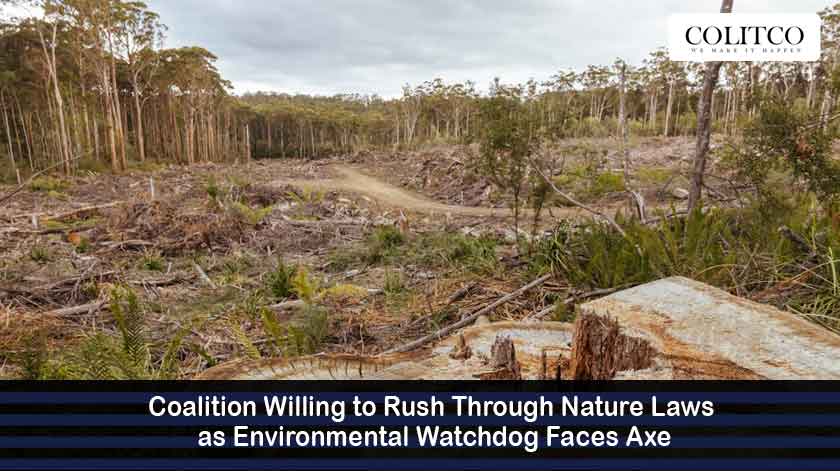The Coalition has signalled readiness to support Labor’s environmental law reforms before year’s end, but only if the government drops plans for a fully independent environmental regulator. The deal would mark one of the most significant compromises in Australian environmental policy, potentially reshaping how the nation protects its threatened species and ecosystems.
Environment Minister Murray Watt faces a December deadline to pass the nearly 1,500-page overhaul of the Environment Protection and Biodiversity Conservation (EPBC) Act. The bill passed the House of Representatives this month but faces an uncertain future in the Senate, where Labor lacks a majority.
The Coalition has made its position clear. Final approval powers must remain with the minister of the day, not an independent Environmental Protection Agency (EPA) as originally proposed.
What’s Being Sacrificed
Labor’s initial reform package promised an independent EPA with teeth. The body would assess major projects independently, set compliance standards, and enforce penalties for environmental breaches without political interference.
That vision is now under threat as Labor scrambles for Coalition support to avoid negotiating with the Greens, who want stronger protections.
Key elements at risk include:
- Independent project approval powers
- A “climate trigger” requiring assessment of greenhouse gas emissions
- Stronger protections for logging-exempt regions
- Mandatory Indigenous consultation standards
- Clear “no-go zones” for irreversible environmental damage
The Coalition doesn’t support an independent EPA. They want ministers to retain control over major development decisions, particularly mining projects.
Opposition Leader Sussan Ley has called Labor’s original reforms an “environmental approvals disaster” that would create layers of bureaucracy and stifle economic growth.

Parliament House during a sitting week
Mining Sector Pushes for Quick Deal
The mining industry is backing calls for rapid passage of the reforms, but with conditions that favour streamlined approvals. The Minerals Council of Australia argues that a balanced approach protecting the environment while enabling critical minerals projects would benefit the sector and the nation.
Australia’s mining sector contributes more than $369 billion in export earnings annually. Companies want certainty around approval processes, particularly as global demand for battery minerals and critical resources surges.
Watt has emphasised the bill includes faster approval pathways for renewable energy projects and mining developments needed for Australia’s net-zero ambitions. But he insists the reforms also deliver stronger environmental protections through new national standards.
“We make no apologies for moving with haste,” Watt told reporters in Canberra. “The challenge for the Coalition is, can they focus over the next couple of weeks?”
Environmental Groups Sound Alarm
Environmental Justice Australia has expressed alarm at reports of a Labor-Coalition deal. Nicola Rivers, the organisation’s Co-CEO, warned that passing new environment laws that ignore climate change and keep politicians in charge of approvals would be “unfathomable.”
“For far too long, our laws have permitted destruction instead of preventing it,” Rivers said. “Strong standards, a quick no for irreversible harm, and an independent EPA are the backbone of real reform.”
The Biodiversity Council reports that 75 per cent of Australians support strengthening national environmental law to protect nature. Only 4 per cent oppose stronger protections.
But converting broad public support into political action remains challenging during a cost-of-living crisis. Environmental concerns often take a back seat when households face immediate financial pressures.
Greens Demand Stronger Action
Greens Senator Sarah Hanson-Young has vowed to close loopholes in the legislation. She particularly wants logging exemptions removed and stronger climate considerations included.
The Greens argue that without a climate trigger, the reforms fail to address Australia’s biggest environmental threat. They point to the Samuel Review, completed under the Coalition government in 2020, which found that without urgent changes, most of Australia’s threatened plants, animals and ecosystems will become extinct.

Chart showing Australia’s threatened species decline
“The Minister is saying he wants to deliver for business and industry,” Hanson-Young said. “How about doing your job as the Environment Minister for the environment?”
Also Read: DroneShield Directors Offload $67M in Shares, ASX Demands Answers
What Happens Next
The final parliamentary sitting week of 2025 starts on November 23. Watt must secure either Coalition or Greens support to pass the reforms through the Senate.
Labor has ruled out forming a coalition with the Greens if the election results in a hung parliament. This makes a Coalition deal more attractive politically, even if it means gutting key environmental protections.
The Australian mining landscape is watching closely. Companies need clarity on approval processes as they plan major investments in critical minerals and renewable energy infrastructure.
Opposition Leader Peter Dutton has indicated he would negotiate with independents to form government if given the chance. His environmental agenda focuses on “cutting green tape” and repealing nuclear power bans.
Whether Labor accepts the Coalition’s terms remains unclear. But the clock is ticking, and the government faces the uncomfortable choice between compromised reform now or uncertain prospects after the election.
The coming weeks will determine whether Australia gets a weakened environmental watchdog or continues with its current 25-year-old legislation that has presided over declining environmental outcomes.












